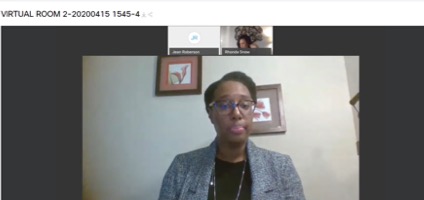
Last fall, Samford’s Ida Moffett School of Nursing and School of Public Health received a three-year, $1.3 million Opioid Workforce Expansion Program grant designed to expand its community-based experiential student training for students preparing to become behavioral health professionals.
Due to the recent online transition in response to the COVID-19 pandemic, students recently completed the Opioid Workforce Expansion Program’s first interprofessional virtual simulation.
Evidenced-based practices were used to develop and implement a virtual learning activity to prepare the students for complexities, which occur when providing care for individuals with mental health disorders, including opioid use disorder (OUD) and other substance disorders (SUDs). Students from the college’s social work and psychiatric mental nurse practitioner disciplines, worked together utilizing learned skills to assess standardized patients which they could see and interact with virtually.
The standardized patients portrayed characteristics of real patients with a behavioral health disorder such as opioid use disorder. Students worked together to assess the patients and develop treatment plans. A lead faculty member and additional instructors observed the simulation while compiling feedback for the students.
Following the completion of the students’ assessment of the standardized patient, the students, faculty and observers debriefed together. The comprehensive feedback on team performance facilitated joint discussion of the technical and real-life aspects of the cases.
Stephanie Wynn, professor for Ida Moffett School of Nursing and grant manager, explained that while a virtual simulation was not part of the original grant curriculum, the skills gained through this learning activity, especially telehealth communication, have proven to be necessary during the pandemic.
“In the wake of the COVID-19 pandemic, providers around the world are utilizing telehealth to provide patient care. The use of health technology to assess patients virtually is a reality that many providers are facing for the first time,” said Wynn. “Moving forward, I believe we will continue to face new realities in health care. This virtual simulation has further prepared our students to serve as behavioral health professionals regardless of the location, scenario or means.”
Opioid Workforce Expansion Program-Professional “This project is supported by the Health Resources and Services Administration (HRSA) of the U.S. Department of Health and Human Services (HHS) under grant number, T98HP33417, and title, Opioid Workforce Expansion Program-Professional for $1,342,320. This information or content and conclusions are those of the author and should not be construed as the official position or policy of, nor should any endorsements be inferred by HRSA, HHS or the U.S. Government.”
